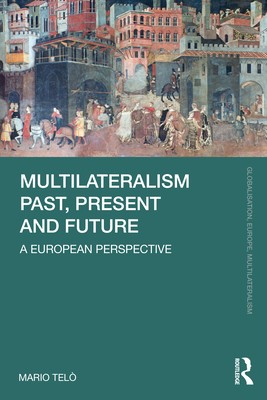
- We will send in 10–14 business days.
- Author: Mario Telò
- Publisher: Routledge
- ISBN-10: 1032245433
- ISBN-13: 9781032245430
- Format: 15.6 x 23.4 x 2.3 cm, softcover
- Language: English
- SAVE -10% with code: EXTRA
Reviews
Description
This book offers an important chronological perspective on the evolution of multilateralism within Europe and beyond.
It provides a critical reconstruction of the history of the idea and praxis of peaceful global governance, comparative analysis of regional multilateral organizations and a discussion about concrete trends and perspectives of a new multilateralism against the challenging context of the current multipolar power politics. Focusing on the changing European interplay with multilateralism - from Eurocentric cradle of civilian cooperation among sovereign imperial states, to political dwarf after the two WW and decolonization, and to potential co-leader of a multi-layered and multi-actor cooperation within the current multipolar order, it addresses a theoretical 'gap' by fuelling the long-recognised idealism v. realism debate over international cooperation and institutionalisation with both historical and new empirical insights.
This book will be of key interest to scholars and students of European studies, global governance, multilateralism, international organisations and more broadly to international relations.
EXTRA 10 % discount with code: EXTRA
The promotion ends in 20d.07:30:49
The discount code is valid when purchasing from 10 €. Discounts do not stack.
- Author: Mario Telò
- Publisher: Routledge
- ISBN-10: 1032245433
- ISBN-13: 9781032245430
- Format: 15.6 x 23.4 x 2.3 cm, softcover
- Language: English English
This book offers an important chronological perspective on the evolution of multilateralism within Europe and beyond.
It provides a critical reconstruction of the history of the idea and praxis of peaceful global governance, comparative analysis of regional multilateral organizations and a discussion about concrete trends and perspectives of a new multilateralism against the challenging context of the current multipolar power politics. Focusing on the changing European interplay with multilateralism - from Eurocentric cradle of civilian cooperation among sovereign imperial states, to political dwarf after the two WW and decolonization, and to potential co-leader of a multi-layered and multi-actor cooperation within the current multipolar order, it addresses a theoretical 'gap' by fuelling the long-recognised idealism v. realism debate over international cooperation and institutionalisation with both historical and new empirical insights.
This book will be of key interest to scholars and students of European studies, global governance, multilateralism, international organisations and more broadly to international relations.


Reviews